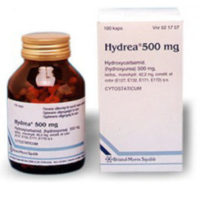Description
Description:
Drug Uses
Imatinib is recommended to patients with myeloid luekemia in chronic or accelerated phase and other conditions determined by your doctor.
How Taken
Take Imatinib as determined by your doctor. Usual dosage is from 100mg to 400mg for adults once a day.
Missed Dose
If you miss a dose take it as soon as you remember. However if it is almost time for the next dose, skip the Missed Dose and continue your regular dosing schedule. Do not take a double dose to make up for a missed one.
Storage
Keep the product away heat, moisture and light. The temperature should be between 59–86F (15–30 C). Make sure children cannot reach it.
More Information
You may need a dosage adjustment or special monitoring during treatment. Do not share this medicine with others for whom it was not prescribed. Do not use this medicine for other health conditions. If your symptoms do not improve or if they worsen, contact your doctor. Imatinib should only be used under the supervision of a doctor experienced with the use of cancer medicines. Imatinib may cause a decrease in the body’s blood cells (bone marrow suppression), which could cause bleeding problems or infection. It may also cause blood cell cancer. Notify your doctor immediately if you develop easy bleeding or bruising, unusual fatigue, rash, hives, difficulty breathing, tightness in the chest, swelling of the mouth, face, lips, or tongue, or signs of an infection, such as persistent sore throat or fever while using Imatinib.
Warnings/Precautions
Before taking Imatinib, tell your doctor or pharmacist if you have any medical conditions, especially if you have allergies to medicines, foods, or other substances, if you have bone marrow depression, an infection, low white blood cell count, kidney problems, shingles, or chickenpox, or are undergoing radiation therapy, if you have used Iressa before and it did not work, if you are a female of childbearing age, if you are pregnant, planning to become pregnant or are breast–feeding. Iressa has been shown to cause harm to the fetus. Avoid becoming pregnant while taking Imatinib. If you think you may be pregnant, discuss with your doctor the benefits and risks of using Imatinib during pregnancy. It is not known if Iressa passes into breast milk. Do not breastfeed while taking Iressa. Some medicines may interact with Imatinib, therefore tell your doctor of all prescription or nonprescription medicine, herbal preparation, or dietary supplement that you are taking. Do not take Imatinib if you are taking nalidixic acid. Iressa should me used with extreme caution in children, safety and effectiveness have not been confirmed. If nausea, vomiting, or loss of appetite occurs, ask you doctor or pharmacist for ways to lessen these effects. Imatinib may lower your body`s ability to fight infection. Prevent infection by avoiding contact with people with colds or other infections. Notify your doctor of any signs of infection including fever, sore throat, rash, or chills. Check with your doctor before having vaccinations while you are using Iressa. This medication may reduce the number of blood cells that are needed for clotting. To prevent bleeding, avoid situations where bruising or injury may occur. Lab test, including complete blood cell counts, may be necessary to monitor your progress or to check for side effects. Be sure to keep all doctor and lab appointments.
Disclaimer
This is only general information, it does not cover all directions, drug integrations or precautions. You should not rely on it for any purpose, it does not contain any specific instructions for a particular patient. We disclaim all responsibility for the accuracy and reliability of this information. We`re not responsible for any damage.
Possible Side Effects
Some of the Possible Side Effects are– diarrhea, hair loss, nausea, vomiting. Contact your doctor if any of these or other side effects occur. If you experience any of the following serious side effects, you should seek medical attention immediately– allergic reactions (rash, hives, difficulty breathing, tightness in the chest, swelling of the mouth, face, lips, or tongue), black, tarry stools, blood in urine or stools, dark urine, diarrhea, fatigue, fever or chills, irregular or absent menstrual periods, joint pain, lower back or side pain, persistent cough, persistent nausea or vomiting, sore throat, sores on the mouth or lips, stomach pain, swollen feet or lower legs, unusual bruising or bleeding, unusual lumps or growths, unusual tiredness, weight loss, yellowing eyes and skin.



Reviews
There are no reviews yet.